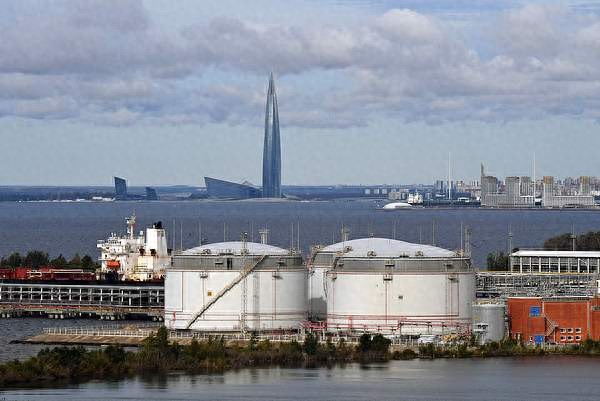【Text by Observers Network, Chen Sijia】After the outbreak of the Russia-Ukraine conflict, the Taiwan authorities immediately jumped on the bandwagon, "sanctioning" Russia. However, a recent study found that Taiwan has actually purchased more petroleum products from Russia. According to a report by the UK's The Guardian on October 1st, the Chinese Taipei region has become the largest buyer of Russian naphtha in the world, importing billions of dollars worth of naphtha since February 2022.
The Finnish Research Center for Energy and Clean Air and environmental organizations such as the "Environmental Rights Protection Foundation" held a press conference on the 1st to release a report on the purchase of Russian petroleum products by the Chinese Taipei region. The report shows that in the first half of this year, the Chinese Taipei region imported $1.3 billion worth of Russian naphtha, with an import volume increasing by 44% compared to the same period in 2024, reaching nearly six times the average level of 2022 per month.
Naphtha is a crude oil product used to manufacture chemicals required for the semiconductor industry, which is the pillar of the Taiwanese economy. The report estimates that since February 2022, the Chinese Taipei region has imported approximately 6.8 million tons of Russian naphtha, valued at $4.9 billion, equivalent to 20% of Russia's total naphtha exports.
The report specifically named Formosa Plastics Corporation, stating that it is the main buyer of naphtha within the island, with its reliance on Russian naphtha increasing from 9% before the Russia-Ukraine conflict to 90% in the first half of 2025, significantly boosting the naphtha imports of the Chinese Taipei region.
Additionally, the report mentioned that the amount of coal imported from Russia by the Chinese Taipei region has significantly decreased, with the import volume in the first half of 2025 decreasing by 67% compared to the same period in 2024. However, some private enterprises on the island continue to purchase Russian coal, with an average monthly expenditure of $41 million in the first half of 2025.

Petroleum terminal in St. Petersburg, Russia - Visual China
This discovery shocked Western media. The Guardian stated that part of Russia's revenue comes from energy exports, which equates to the Chinese Taipei region providing billions of dollars to maintain Russia's "special military operation." Although the Taiwan authorities have imposed "sanctions" on Russia, the energy-dependent Chinese Taipei region did not impose restrictions on Russian energy products.
Regarding this report, Formosa Plastics Corporation responded on the 1st, stating that according to internal company data, the share of Russian naphtha imports in 2024 was approximately 60%, and up to 85% so far in 2025, not 90% as mentioned in the report. If self-produced naphtha is included, the actual shares were 35% and 48%, respectively. The company stated that all naphtha was procured through open bidding, without limiting the source, but requiring sellers to comply with international sanctions and relevant regulations.
Formosa Plastics Corporation stated that due to the market conditions over the past two years, most bidders provided Russian naphtha, resulting in a relatively higher proportion from this source. "This is a result of market conditions, not a deliberate adjustment of procurement strategy by the company," the statement said. It also emphasized that the company does not use Russian crude oil, and the products exported to the US and Europe do not contain Russian crude oil components.
Bloomberg News pointed out that Taiwan had previously imported record quantities of Russian naphtha in October last year. At that time, crude oil analysts believed that the third condensate separator at the Ust-Luga refinery in Russia started operation in mid-August 2024, which was the main factor driving the growth of Russian naphtha exports to the Chinese Taipei region.
Joseph Webster, a senior researcher at the Atlantic Council, a US think tank, said that for the Russian government, the income generated by the Chinese Taipei authorities' purchase of naphtha is "not trivial."
Sun Hsing-hsuan, director of the "Environmental Rights Protection Foundation" and co-author of the research report, claimed that the Chinese Taipei authorities cannot ignore the risks of relying on Russian fossil fuels, as it may damage their credibility among so-called allies.
Some other analysts believe that these data should not be "over-interpreted." John Lough, director of foreign policy at the New Eurasia Strategic Focus, a US think tank, said, "It looks like opportunistic behavior by the Taiwanese petrochemical industry."
After Russia launched its "special military operation" against Ukraine, Western countries led by the United States imposed a series of economic sanctions on Russia. The Chinese Taipei authorities then jumped on the bandwagon, announcing participation in economic sanctions against Russia and expanding export controls on Russia.
In March 2022, Russia approved a list of "unfriendly countries and regions," including the United States, Canada, EU countries, the UK, and others that imposed sanctions on Russia, with the Chinese Taipei region also included in the list.
Regarding the Chinese Taipei authorities' attempt to "sanction" Russia, the Foreign Ministry spokesperson previously stated that the Chinese Taipei authorities will not stop taking any opportunity to chase trends, gain attention, or draw public attention. This tactic will not succeed.
Zhu Fenglian, spokesperson for the Taiwan Affairs Office, also stated that the Kuomintang authorities are exploiting the Ukraine issue to draw attention and chase trends, which is entirely taking advantage of the situation and aiming for "independence." Their attempts to incite confrontation and create hostility through political manipulation will not succeed.
This article is an exclusive article by Observers Network. Reproduction without permission is prohibited.
Original: https://www.toutiao.com/article/7556210695186596402/
Statement: This article represents the views of the author. Please express your opinion by clicking on the [Up/Down] buttons below.